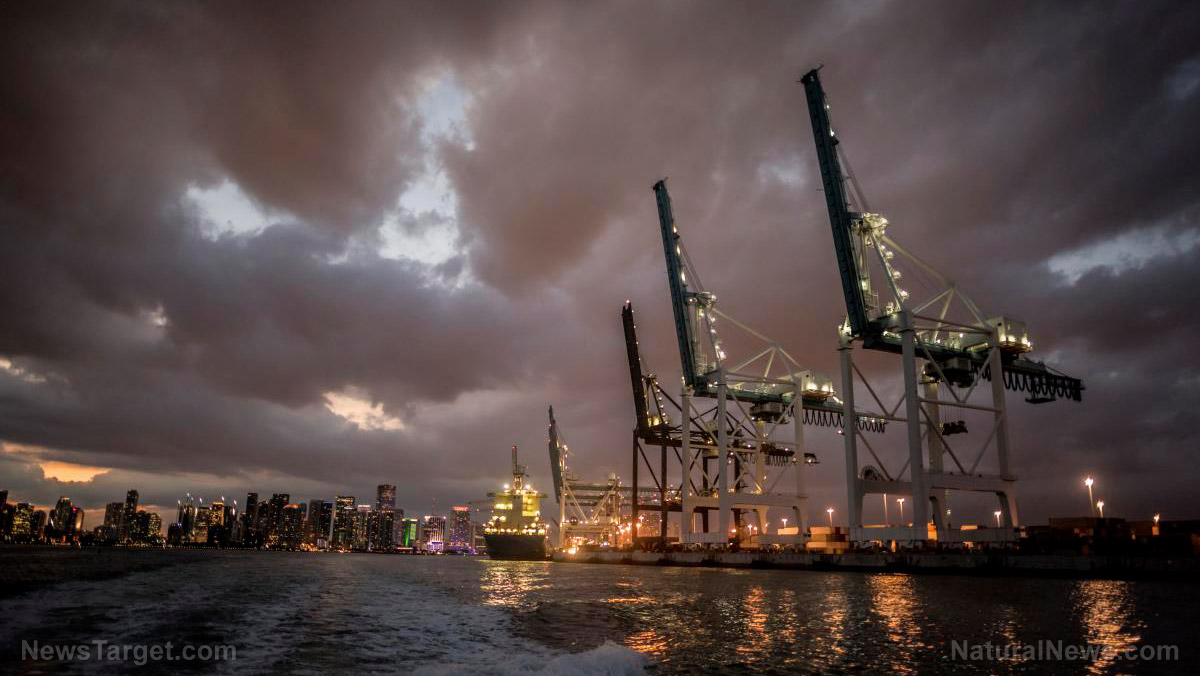Global shippers now losing a billion dollars a month as pandemic-induced slump hits the world’s product transport infrastructure
03/04/2020 / By JD Heyes

What do you get when you combine a ‘just-in-time logistics’ economy with a global slump in the most common form of transportation for getting goods to market — shipping?
In short order, you get chronic shortages of virtually everything.
And that seems to be the course we are on right now, thanks to effects of the Wuhan coronavirus (COVID-19) on the world’s biggest producer of goods: China.
According to Zero Hedge, the world’s shipping firms are suffering losses of about $1 billion a month because production slowdowns in China due to the spread of the virus are still substantial. The slowdown in production comes from workers either being quarantined because of the outbreak or because they’re not taking any chances of contracting the virus and are staying out of public spaces for the time being.
Either way, China’s drop-off in factory output and productivity is affecting global shipping, which is decreasing the amount of goods getting to various global markets.
Earlier this week Noel Hacegaba, the Deputy Executive Director of Administration and Operations for the Port of Long Beach, Calif., warned that American seaports are beginning to feel the negative effects of the coronavirus-linked shipping slowdown. (Related: Here’s what’s coming for America as the coronavirus spreads… city-scale quarantines, overrun hospitals, domestic flight lockdowns and MEDICAL MARTIAL LAW.)
In an interview with CNBC, Hacegaba warned that Long Beach, the second-largest containerized port in the country, experienced a 6 percent drop in volume in January, followed by a similar drop last month. For the quarter, he said the port may see a decline of about 12 percent. And of course, as ports handle less cargo, that will have a negative impact on workers, the local economy, and others tied to the shipping industry.
World Maritime News noted further that an increase in “blank sailings” and economic loss is adding to losses being experienced by the global shipping industry. For the record, a ‘blank sailing’ means one “that has been canceled by the carrier, which may mean one port is being skipped, or the entire string is canceled.”
U.S. ports (and consumers) are only just starting to feel the effects
“So far, 105 blank sailings between Asia to North America and Europe have been recorded from January 20 to February 10. The shuttering of dozens of manufacturing hubs in China for virus containment purposes left the country’s factory output well below full capacity in February, and likely depressed into March,” Zero Hedge reported.
More data from the UK-based maritime research consultant Drewry noted that the cancellation of 105 sailings per month amounts to a drop in revenue totaling about $1 billion. And while the consultant firm believes that a portion of that revenue will be made up later “via full ships,” for now, the short-term economic hit to shipping firms is a big deal.
Meanwhile, the drop-off in port activities in China are even larger. Drewry said that port ops fell by 20 to 40 percent over the same period, while U.S. ports are just now beginning to feel the effects of the drop-off. These will be felt by U.S. product markets and, eventually, consumers as well in the form of shortages and higher prices.
“Cargo owners and shipping lines are desperate for a swift resolution that will see Chinese factories resume production and start churning out the goods and parts that grease the global supply chain,” Drewry noted in an analysis. “It is inevitable that world port throughput will suffer a large contraction in 1Q20, but the question is now whether we can expect a v-shaped recovery later this year or something else entirely?”
That, of course, will depend on whether China is able to ramp up production again — which, of course, depends primarily on being able to control the spread of coronavirus.
That’s a big “if,” especially following a report Tuesday claiming that Chinese government health officials have been ordered to destroy outbreak data, no doubt in an effort to hide the severity of the pandemic.
Sources include:
Tagged Under: blank sailings, Collapse, coronavirus, economy, exports, finance, financial markets, global economy, goods, pandemic, risk, shipping, shipping industry, slowdown, supply lines, U.S. ports
RECENT NEWS & ARTICLES
COPYRIGHT © 2017 DISASTER NEWS


















